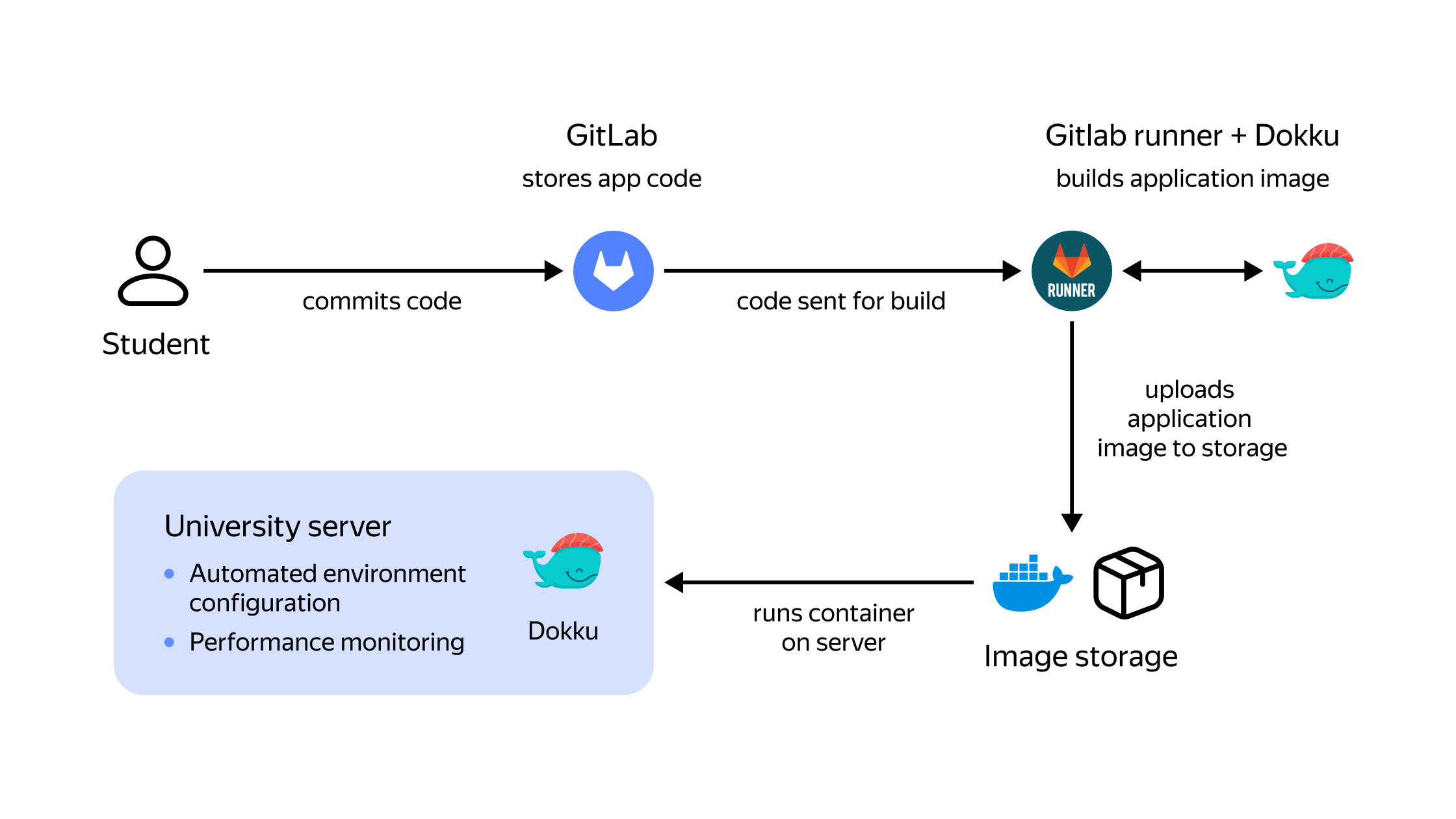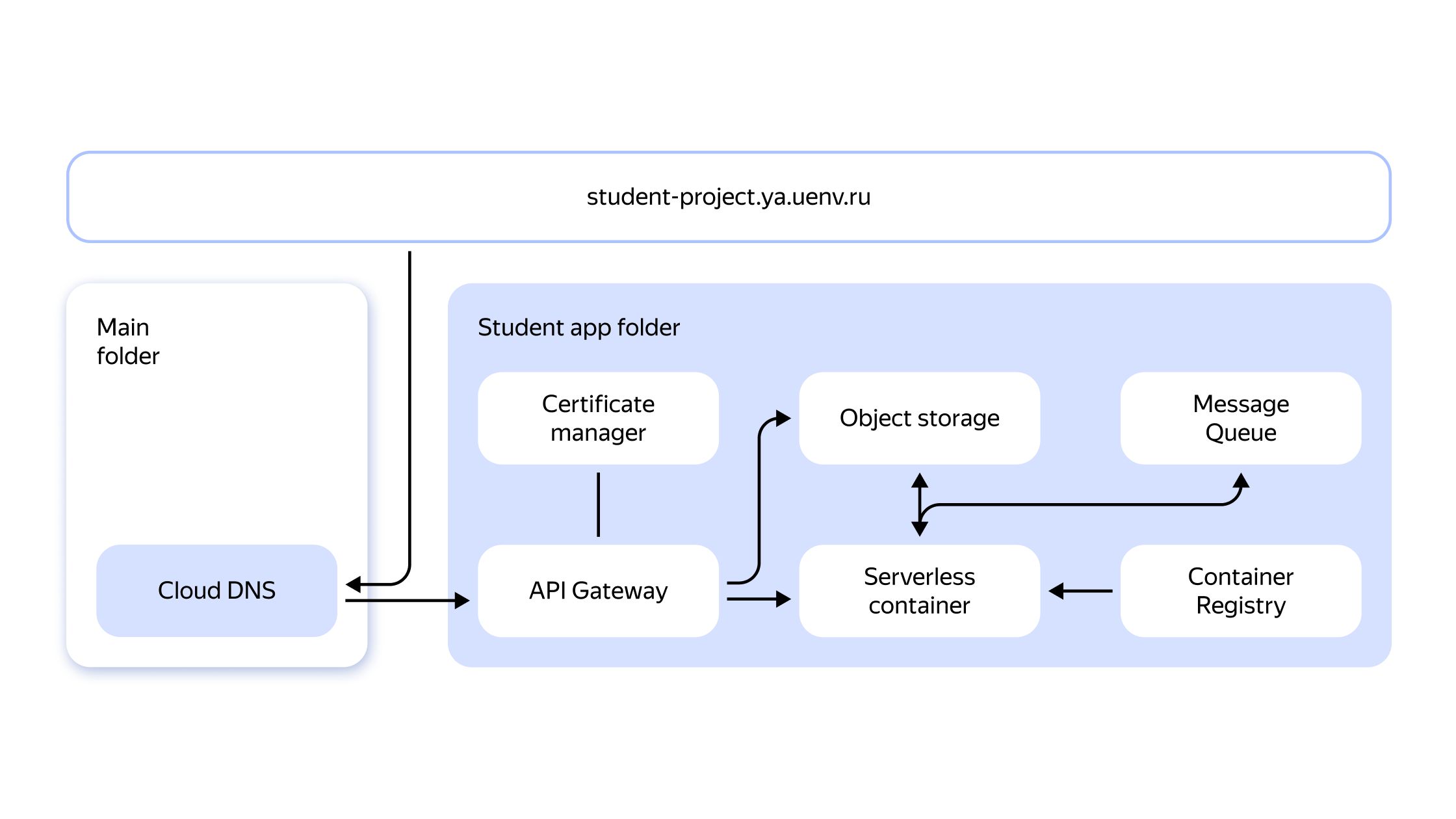Kazan Federal University’s success story: Simplifying project deployment with Yandex Cloud’s serverless technologies

Background
In this article, we’ll talk about
The Institute of Information Technology and Intelligent Systems (ITIS)
Within just two months, the lab’s professionals independently built their entire infrastructure, backed with Yandex Serverless Containers and other Yandex Cloud solutions.
The lab now uses cloud resources to provide testing environments and benches for student-developed apps. Currently, 40 apps are running in the cloud, with expectations to deploy around 10 new apps each year. By migrating to Yandex Cloud, the lab reduced the infrastructure maintenance costs by over 150%. The cloud platform enables saving a significant amount of money by charging users on the pay-as-you-go basis, e.g., based on the number of function calls or database requests, as well as by minimizing the number of infrastructure-related incidents. Moreover, the team has effectively resolved scalability challenges without requiring additional investment.
Company goal
The Institute of Information Technology and Intelligent Systems (ITIS) is an innovative IT faculty established in 2011 through a joint initiative by the Ministry of Digital Development of the Republic of Tatarstan, Kazan Federal University (KFU), and some leading IT companies in the region.
Guided by top IT workforce, ITIS students gain hands-on experience both in practical training and R&D projects across more than 20 labs established through collaboration between the IT industry and ITIS. Launched in 2017 within KFU’s Software Engineering Department, Smart Education Lab focuses on developing educational initiatives, such as learning management systems, new educational models in engineering and IT education, and apps designed to nurture professional skills.
Each year, Smart Education Lab hosts around 50 students working on those projects. Mentored by both faculty members and lab staff, they build teams and manage software development workflows that closely mirror real-world industry practices.
Previously, test versions of those projects were hosted on UniEnv, a KFU’s in-house platform by ITIS, for hosting and maintaining student projects. However, UniEnv relied on virtual machines and required additional effort to scale.
By the third year of the platform operation, it became clear that its infrastructure would hardly bear even 10 more new projects. Initially, the team considered scaling the current solution by adding more VMs, but they had to abandon this approach due to lack of consistent workload on the deployed apps. What they needed was a solution that could:
-
Support the deployment of 10 new projects every year, without extra effort from system administrators.
-
Maintain 40 apps that were already running, each used by between 1 and 100 users per week.
-
Run code in multiple programming languages, including Python, JavaScript, Java, C#, and PHP.
To meet these needs, ITIS explored a number of cloud platforms that could offer dynamic scalability while reducing operational costs. The reliability and flexibility of cloud solutions also mattered, as this would help the team overcome the limitations of the university’s in-house hardware.
When seeking for an appropriate option, the Lab looked for a cloud provider that:
-
Offered a comprehensive collection of tools and features capable of supporting all apps and systems developed within Smart Education Lab.
-
Delivered proprietary solutions, with no exposure to any licensing risks.
-
Had data centers in Russia, to comply with the local laws and regulations.
-
Had 24/7 technical support that was able and willing to resolve issues quickly.
-
Had an intuitive management interface and a feature-rich member area.
After reviewing a number of competing options, the Lab’s staff ultimately opted for Yandex Cloud, impressed by its broad range of features, as well as rapid and professional around-the-clock responses from its support team. The team at Smart Education Lab also found that serverless technology by Yandex Cloud was particularly well-suited for practicing education-related tasks, running computing resources only when triggered by user requests, which significantly boosts overall efficiency. Furthermore, Yandex Cloud provides well-structured guides and user-friendly interfaces, both graphical and command-line, making it easy for users to grasp the essence quickly and start working right away.
Cloud infrastructure for student-developed projects
The student projects from Smart Education Lab were initially hosted on the KFU’s in-house platform, UniEnv, which was designed to support university apps and student-developed software.
Project deployments were handled through GitLab CI and a PaaS platform called Dokku, which used Docker-based containerization. This platform automatically builds apps written in Java, C#, Python, PHP, Ruby, Node.js, and other programming languages.

However, it became clear soon that this setup was not optimal. The available resources were no longer sufficient for deploying new apps, and Dokku could no longer handle automated builds for more than 50% of the projects underway. Additionally, the traffic to student apps was highly inconsistent, with occasional spikes during the academic week yet little usage at other times. Under these conditions, keeping all apps running continuously made little sense.
Seeking to address the said challenges, Smart Education Lab made its decision to use the Yandex Cloud infrastructure, particularly its serverless technology. With serverless computing, each incoming request automatically triggers the creation of a dedicated container or VM with the required specifications. Yandex Cloud handles all underlying infrastructure management, including server administration, database maintenance, software updates, and integration with other solutions. Once the task is completed, its associated temporary instance (container or VM) is automatically terminated and removed.
When new apps are added, resources for function execution, data storage, fast request handling, and performance stability automatically scale to meet unpredictable loads.
Now, student-developed apps are deployed as follows:
-
First, the app is packaged into a Docker image and uploaded to Yandex Container Registry.
-
Second, an instance of Yandex Serverless Containers is launched from that image and connected to Yandex API Gateway.
-
If needed, the students also get access to Yandex Object Storage for file storage and Yandex Message Queue for inter-app messaging.

Using a unified university account, the team implemented centralized authentication system based on the security assertion markup language (SAML) open standard for secure data exchange, authentication, and authorization. Student teams access cloud resources through the Yandex Cloud API, with the permissions strictly limited to the relevant team folder.
With active student involvement, the lab team also developed a domain management system within the UniEnv platform: students simply specify their folder name and the endpoint URL provided by Yandex API Gateway, after which the system automatically configures both the domain and SSL certificate by means of Yandex Cloud DNS, Yandex Certificate Manager, and Terraform.
As a result, all student apps now run in the cloud, while only databases and continuously running UniEnv infrastructure components, such as CI/CD and Sentry, remain on-premises, hosted on VMs within the KFU’s in-house server.
To ensure smooth adoption, the project team documented the entire process of managing cloud features directly in the UniEnv platform docs. This included a clear, step-by-step guide for deploying apps, along with the links to the relevant Yandex Cloud help guides containing detailed instructions. Some articles also offer lecture recordings and sample source code, making it easier for students to understand and utilize the infrastructure in an efficient way.
The entire deployment project in Yandex Cloud took 60 days, with most of the migration carried out directly by the student teams. Configuring the SAML-based authentication system through the university account, however, was handled by ITIS engineers and took them just a few days.
Of course, there were challenges along the way. Over the implementation stage, both the ITIS staff and students encountered issues with the Yandex Cloud Terraform module. Fortunately, these were resolved quickly with the help of Yandex Cloud support team and an active Yandex Cloud’s community member in Telegram.
Throughout each project, the students engage in hands-on problem-solving that goes beyond academic theory, helping them develop essential teamwork and decision-making skills. This approach does not only strengthen technical knowledge but also fosters soft skills, making education more practical and better aligned with the real-world career demands.
Deployment is an integral part of every team’s workflow. Thanks to serverless technology, this process has become both cost-effective and straightforward, especially given the relatively low and inconsistent traffic across most student projects.

Artur Atnagulov,
Director for Technology at Smart Education Lab, KFU’s ITIS
Results
In this new setup, ITIS managed to reduce its annual infrastructure maintenance costs from ₽50,000 to just ₽18,000. Moreover, the team found a long-term solution to previously existing infrastructure limitations.
The cloud platform also offers cutting operation costs due to full flexibility in dynamically managing computing resources through its pay-as-you-go pricing.
Apart from that, ITIS engineers were able to address some other key issues:
-
While the previous hosting platform struggled to deploy apps with non-standard file and folder structure in the source code, now they run as intended.
-
Students now gain direct experience operating a cloud environment.
-
Cloud platform integration is now part of the curriculum for second and third-year students.
-
The challenge of scaling has been successfully resolved.
More importantly, the number of infrastructure-related incidents has dropped significantly.
Looking ahead, ITIS expects to keep enjoying Yandex Cloud features, helping students in their research during the final degree projects.

